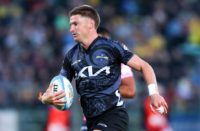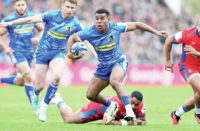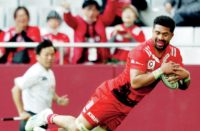 Olly Barkley's move to Racing Metro is a bolt from the blue for Bath supporters, and the real issue is that the club know what they are doing because, at fly-half since the start of the season, he's been in great form kicking goals, and playing well all-round. He has been almost a perfect fit for Gary Gold, helping the new Bath regime to bed in with a team that are well organised from 1 to 8, and a backline that is a work in progress.
Olly Barkley's move to Racing Metro is a bolt from the blue for Bath supporters, and the real issue is that the club know what they are doing because, at fly-half since the start of the season, he's been in great form kicking goals, and playing well all-round. He has been almost a perfect fit for Gary Gold, helping the new Bath regime to bed in with a team that are well organised from 1 to 8, and a backline that is a work in progress.
Bath fans will need to be reassured that the club are doing the right thing in releasing such an important player – in other words that they have released Barkley knowing that either Stephen Donald is coming back to fitness and in much better form than he was last season, Sam Vesty has improved considerably on what he has shown since joining the club from Leicester, or Tom Heathcote is catching the eye.
Barkley clearly loves the Bath club, and the community, as he showed with his quick return from Gloucester. However, he is in his early thirties, and moving into the latter stages of his playing career he is clearly going to be attracted by a great financial deal from Racing, and also the chance to live in Paris and experience a whole new culture. The offer was too good for Barkley to turn down, and possibly also for Bath to ignore. All we know is that negotiations on all sides must have gone well for the thing to be settled so quickly.
Barkley is a bit of a utility back, covering fly-half and centre, and he must have thought hard about the move to France in the knowledge that it will put his England career to bed.
Barkley's move from Bath highlights one of the most topical areas in English rugby: fly-halves. A few seasons ago it was tight heads who were the big news as the top earners in most club sides, but people are coming back to understanding the true value of a class No10.
I have always believed that they are crucial to a club being successful, the key operators whose business is game-understanding and execution – and the good ones are few and far between. When the game is dominated by defence not everyone needs a Dan Carter or Jonathan Davies, but if you want a team to strike the right balance between attack and defence a talented fly-half is indispensable.
Carter is a great because he can play any type of game, and he has been so far ahead of anyone else for the past decade that it is scary. Development coaches in this part of the world must get a grip at fly-half and ask why, given the playing numbers in Europe, there isn't an English or French Dan Carter?
The game needs rounded fly-halves who can run the ball as well as tackle, but we have too many fly-halves at the elite end who are incomplete.
Mercurial attacking fly-halves like Quade Cooper and Danny Cipriani have a habit of going missing in defence, and in the modern game you simply cannot afford that. If Cipriani had the game-management skills and tackling ability of Carter, he would be as good – but Carter can't do what Cooper or Cipriani do, because most of the time they don't have a clue what they are about to do.
Jonny Wilkinson was a world class No10, and was the best in terms of core skills like goal-kicking and tackling until Carter came along, but he could not attack the line like Cooper, Cipriani, or the young Gloucester fly-half hope, Freddie Burns. Getting the right balance at fly-half is a complicated business, yet most Premiership sides still build their game around the No10.
Toby Flood is the number one choice at Leicester, and based on his telepathic link with Ben Youngs a couple of seasons ago, and breaks like the one he made in the 2010 Six Nations against Wales, he was England's first choice until losing his place to Owen Farrell last season. However, Saracens are coached to Brendan Venter's playbook, and in South Africa over the summer Farrell was found wanting. He needs to find a running, attacking game, or he will be no more than a good club player.
I get a lot of questions about when Northampton will dominate and win big trophies. My answer is that the chances of that happening are made more difficult because they have two completely different fly-halves in Stephen Myler and Ryan Lamb. Neither of them have the full confidence of Jim Mallinder, the Saints director of rugby, to the extent that a five match run in the No10 jersey is about the most they will get – and that makes no sense.
Harlequins, by comparison, have the complete opposite in Nick Evans. His tremendous skill-set has made him the fulcrum for the English champions, and that, alongside his consistency at No10, has made Carter's former All Black rival the stand-out player in the Premiership.
Evans is proof that if you have a good fly-half you will become a force to be reckoned with – and my hunch is that if you stuck Farrell at fly-half for Harlequins they would struggle.
One Comment
Leave a Comment
You must be logged in to post a comment.



























Pingback: other